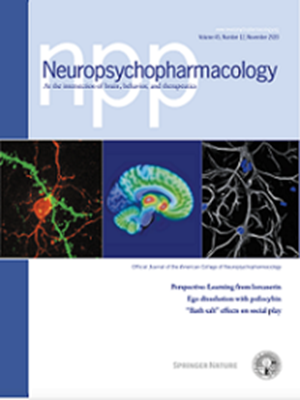抑制排卵避孕药对边缘型人格障碍患者行为和功能障碍的影响。
IF 6.6
1区 医学
Q1 NEUROSCIENCES
引用次数: 0
摘要
边缘型人格障碍(BPD)的特征是情绪、人际关系和行为症状的快速变化,通常与情绪和焦虑障碍合并症。女性比男性更容易被诊断为BPD,并表现出更大的功能障碍。激素波动可能影响BPD症状的表现。在此,我们研究了抑制排卵避孕药对BPD患者行为和功能障碍的影响。样本包括348名年龄在18-50岁之间接受精神疾病住院治疗的女性,其中131人被诊断为BPD。根据患者的避孕方法进行分类:抑制排卵避孕药(145例)和自然周期避孕药(203例)。相互作用模型测试了排卵抑制避孕药对BPD诊断与入院和出院时行为和功能困难之间关系的影响,通过行为和症状识别量表(BASIS-32)的四个领域进行评估:人际关系困难、日常生活困难、抑郁/焦虑和冲动。与没有BPD的女性相比,诊断为BPD的女性更有可能使用抑制排卵的避孕药(p = 0.04)。然而,使用抑制排卵的避孕药与入院、出院或长期的行为和功能障碍无关。抑制排卵的避孕药降低了BPD诊断与人际关系困难(p = 0.004)、日常生活困难(p = 0.01)和抑郁/焦虑症状(p = 0.004)之间的关联。具体来说,BPD患者只有在自然循环时才会出现更多的行为和功能困难,而没有BPD的患者只有在使用抑制排卵的避孕药时才会出现更高的症状严重程度。我们的研究结果表明,抑制排卵避孕药对行为和功能障碍的影响取决于BPD的诊断,并强调了进一步临床研究的必要性。本文章由计算机程序翻译,如有差异,请以英文原文为准。

The impact of ovulation-suppressing contraceptives on behavioral and functional difficulties in borderline personality disorder
Borderline Personality Disorder (BPD) is characterized by rapidly shifting emotional, interpersonal, and behavioral symptoms, often co-morbid with mood and anxiety disorders. Females are more likely to be diagnosed with BPD than males and exhibit greater functional impairment. Hormonal fluctuations may influence the manifestation of BPD symptoms. Here, we investigated the influence of ovulation-suppressing contraceptives on behavioral and functional difficulties in BPD. The sample included 348 females ages 18-50 undergoing residential treatment for psychiatric disorders, with 131 having a BPD diagnosis. Patients were categorized by their contraceptive method: Ovulation-suppressing contraceptives (N = 145) and naturally cycling (N = 203). Interaction models tested the impact of ovulation-suppressing contraceptives on the relationship between BPD diagnosis and behavioral and functional difficulties at admission and discharge, assessed by the four Behavior and Symptom Identification Scale (BASIS-32) domains: difficulties in relationships, daily living, depression/anxiety, and impulsivity. Females with a BPD diagnosis were more likely to use ovulation-suppressing contraceptives compared to those without BPD (p = 0.04). However, ovulation-suppressing contraceptive use was not associated with behavioral and functional difficulties at admission, discharge, or over time. Ovulation-suppressing contraceptives moderated the association between BPD diagnosis and difficulties in relationships (p = 0.004), difficulties in daily living (p = 0.01), and depression/anxiety symptoms (p = 0.004). Specifically, patients with BPD experienced more behavioral and functional difficulties only if naturally cycling, whereas patients without BPD showed higher symptom severity only if using ovulation-suppressing contraceptives. Our findings suggest that the impact of ovulation-suppressing contraceptives on behavioral and functional difficulties varies depending on BPD diagnosis and underscores the need for further clinical studies.
求助全文
通过发布文献求助,成功后即可免费获取论文全文。
去求助
来源期刊

Neuropsychopharmacology
医学-精神病学
CiteScore
15.00
自引率
2.60%
发文量
240
审稿时长
2 months
期刊介绍:
Neuropsychopharmacology is a reputable international scientific journal that serves as the official publication of the American College of Neuropsychopharmacology (ACNP). The journal's primary focus is on research that enhances our knowledge of the brain and behavior, with a particular emphasis on the molecular, cellular, physiological, and psychological aspects of substances that affect the central nervous system (CNS). It also aims to identify new molecular targets for the development of future drugs.
The journal prioritizes original research reports, but it also welcomes mini-reviews and perspectives, which are often solicited by the editorial office. These types of articles provide valuable insights and syntheses of current research trends and future directions in the field of neuroscience and pharmacology.
 求助内容:
求助内容: 应助结果提醒方式:
应助结果提醒方式:


